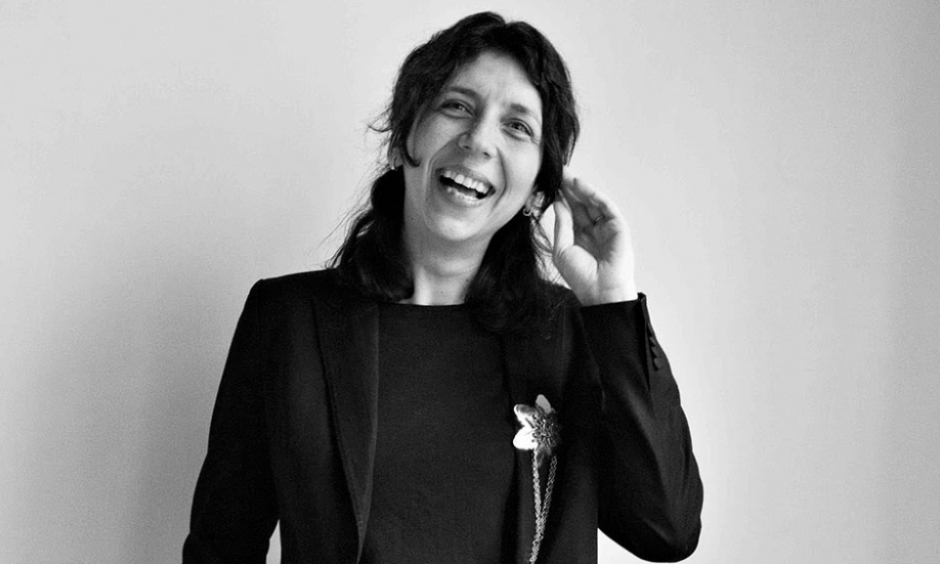Catalina Cernica, Head of Innovation Lab UK, LEO Innovation Lab and CEO, The Health and Happiness Research Foundation
![]()
Interviewed by Kirstie Turner and Michaila Byrne | Content and Editorial Assistants, European Medical Group
![]()
Catalina Cernica is Head of Innovation Lab UK and Global Project Director at LEO Innovation Lab, alongside her role as CEO of the Health and Happiness Research Foundation. We spoke to Catalina at this year’s eyeforpharma London event about the PsoHappy initiative and the challenges associated with changing the view of patients: from being seen as consumers, to people.
What skills or background education is best suited to a career in innovation?
The best innovation comes from multi-disciplinary teams and learning as much as possible about a problem, about your target group, and how to best deliver a solution. If you get those types of skills and people that can deliver on that, I think that’s the most successful combination. Personally, I am one of those people who comes with a very varied background: I worked in consumer insights, I worked in delivering digital solutions, I started, many years ago, in advertising and communications, so I think all this experience matters. It’s even more important to talk about the attitude; good innovation requires empathy, passion, and an entrepreneurial spirit.
As the winner of the eyeforpharma Patient Champion Award, for LEO Innovations’ PsoHappy initiative earlier this year, what inspires you to be a champion for patients?
The most important thing for us was the stories we heard from people living with psoriasis. We realised there was an unmet need in this specific disease, which is still considered, in many parts of the ecosystem, to be ‘just a skin condition’, and it is not: it is a complex autoimmune disease that has significant impact on pain, as well as on social and mental wellbeing. So, we were looking for ways to expose this better and to highlight the impact living with psoriasis has on patients. This is how we discovered happiness methodologies, leading us to better understand the happiness gaps: the differences in happiness reported by people living with psoriasis and general populations among 21 countries in the report we published last year. Showing this value to patient associations and to the healthcare community at large was what kept us going.
What achievements are you most proud of from your time working on PsoHappy?
I’m very proud that we managed to publish two world psoriasis happiness reports, which are unique and have been well received by doctors, patient associations, and patients. We have a third one coming up soon.
The reports have been used as an advocacy tool by IFPA and their members for the last 2 years, including an event at the World Health Assembly in 2018. More than 200,000 people living with psoriasis have engaged with the PsoHappy platform and helped us gather these unique insights into what makes happiness for them.
I think the award we received from eyeforpharma is also an award for resilience and a little bit of stubbornness. In pharma, we are unfortunately guilty of sometimes thinking in year-long campaigns, rather than long term and something like an ongoing, yearly report on the impact that psoriasis has on wellbeing is a long-term commitment and the fact that we’re here today, is a part of our biggest achievements.
On a personal level, I presented the project at the DTU High Tech Summit in Copenhagen, Denmark, and at the end of the presentation, an academic with an interest in happiness came and gave me a hug and said that we need more work like that because it’s not very often that we bridge social and medical sciences. That was a very nice piece of recognition.
What are some of the main challenges in changing the perception of patients, from being seen as consumers to being recognised as people?
It is interesting that we’re having this conversation in the context of the conference because we talk about ‘patient centricity’, but we actually want to be more ‘people-centric’. It is about seeing patients as people and not focussing on managing their disease but understanding their lives and helping them live fulfilling and happy lives. They just happen to have psoriasis or another chronic disease and now they are well-equipped to manage that condition in the best way. I’ve seen a lot of rolling eyes in the last 3 years when I try to talk about happiness; people are a little bit sceptical about it, but I think it has grown a lot. Bringing these ‘well-being lenses’ to exploring the impact chronic diseases have on quality of life has helped elevate the understanding and perception of patients and it’s helping the whole system move from patients having diseases that need to be managed, to people with lives that we want to help fulfil their potential.
How has your role at LEO Innovation Lab complemented you in your position as CEO of The Health and Happiness Research Foundation?
PsoHappy is the founding asset of the foundation and has been developed and incubated by LEO Innovation Lab, which is very entrepreneurial and has start-up like principles. We operate in lean teams, applying an iterative and agile approach to development. This requires us to test our hypothesis with our target users before scaling up, and ensures our platform is highly optimised.
All that experience is very useful in managing a foundation, which is in essence a start-up, so we’re looking to find our best fit in the market to clarify our strategy, to understand where we fit. Our mission is to bridge social sciences with clinically driven quality of life measures, which seems simple, but having gone through conversations with universities and doctors, it’s almost like we were a Vulcan and we decided to have a baby with a Klingon. In pharma, and healthcare in general, we tend to perceive psychology as ‘fluffy’ and we think that happiness is not a serious measure, but we want to bridge this and get economists, anthropologists, and psychologists to work together with doctors, specialists in chronic diseases, and healthcare professionals to design the best way to look at patient outcomes and patient treatment.








